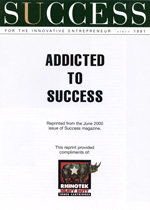
Jerry Chamales travels a hard road to the top.
(June
2000)
by Dina Ingber Stein, Success
Gerald “Jerry” Chamales didn’t have the kind of resume that
inspires confidence. At the age of 26 he was a street bum: addicted to drugs and
alcohol, sleeping in homeless shelters or crashing on a friend’s sofa. He spent
six months in a psychiatric hospital. Today, Chamales, 48, is president and CEO
of a $35 million company and lives in a mansion just down the block from the
site of O.J. Simpson’s former Brentwood estate. Here’s how the fairytale
unfolds. In 1977, with the help of an addiction recovery program and a few good
friends, Chamales was determined to turn his life around. He got a job with a
small telemarketing firm selling computer printer ribbons. “I was so committed
to rebuilding my life, that I worked harder than anyone else,” he says. “I read
books on sales techniques, listened to motivational tapes. Within a year I was
the top salesman.” That first taste of success ignited a desire for more.
Believing he could run this business better than his employer, Chamales took the
$7,000 he’d saved from his job, rented an office, and launched his own
telemarketing firm. It was a disaster. “I just wasn’t ready. I didn’t know how
to run a company,” he says. “I had too many expenses. I was so scared that I
couldn’t even lift the phone to call customers. Within a few months I’d burned
through all my savings, and I was $1,200 in debt.” On the advice of a friend, he
decided to start over—on a much smaller scale. He set up shop in his tiny
Venice, Calif. apartment with just an $80 laminated table and a telephone. This
time, he told himself, “failure is not an option.” He named his company “Omni
Computer Products,” because it sounded impressive. “There was an Omni magazine
and a car named Omni. When I called people and said, ‘I’m Jerry Chamales with
Omni Computer Products,’ they thought I was a big outfit.” His idea was to
market the same kind of product he’d been selling in his previous job. “The
computer industry was fairly new back then. I looked through some industry
publications and found only three or four companies producing IBM-compatible
impact printer ribbons. I called them all. One turned out to be a guy who was
just starting out in business himself. We needed each other. I guess it was
propitious.” When Chamales closed a sale he would pass the order on to the
supplier, who would put the Omni label on the products and then ship them out.
The supplier gave Chamales 40-day payment terms, while Chamales gave his
customers 30-day terms. That gave him some liquidity. “I didn’t spend until I
absolutely had to. I used credit cards for living expenses and to float the
phone bill.” With no inventory and virtually no overhead, he was able to pay off
his debts and move into the black. For the first five years, he paid himself
only $200 a week. Chamales would make 75 to 100 calls a day, convincing
corporate customers that he could provide the same quality product as the big
name brands at lower cost. Within a few months he was doing well enough to hire
some telemarketers. In less than a year, he’d moved into a larger apartment. By
the early ‘80s, Omni was a multimillion-dollar company. Chamales decided it was
time to expand and manufacture his own products. Today Omni produces
OEM-compatible inkjet and laser toner cartridges, all of which are sold under
the brand name Rhinotek. There are several unique aspects of Jerry Chamales’
story that have undoubtedly contributed to the success of Omni. The first is his
hiring practice. About one-third of Omni’s 200 employees are, like Chamales
himself, recovering substance abusers recruited from recovery centers and
half-way houses. “These are people who really want to succeed. They’re highly
motivated,” he says. He takes special care of these employees, putting them
through intensive training, providing them with in-house mentors, even lending
hundreds of thousands of dollars to help purchase cars or homes. That’s not to
say he hasn’t had problems, including death threats from one thieving worker he
fired. He has since learned to screen potential employees more carefully, giving
them a psychological profile test. As a result, he says, these employees have a
15 percent first-year retention rate. That may not sound impressive, but in the
telemarketing industry, it’s unusual. “In sales jobs, it’s not uncommon to have
200 percent turnover in the first year,” says Gene Gray, former president of the
American Teleservices Association. Chamales’ move into manufacturing is also
unique among telemarketing firms, says Gray. For Chamales, though, it was just
one more step on his road from addict to entrepreneur. He now retails his
product, has a new call center that will accommodate an additional 350
salespeople, and intends to start marketing on the Web. He expects sales to
reach $220 million by the year 2002. “It’s not where you start in business,”
says Chamales. “It’s where you finish.”
Dina Ingber Stein is a freelance
writer with more than 20 years of experience writing for magazines. She is based
in New Jersey.